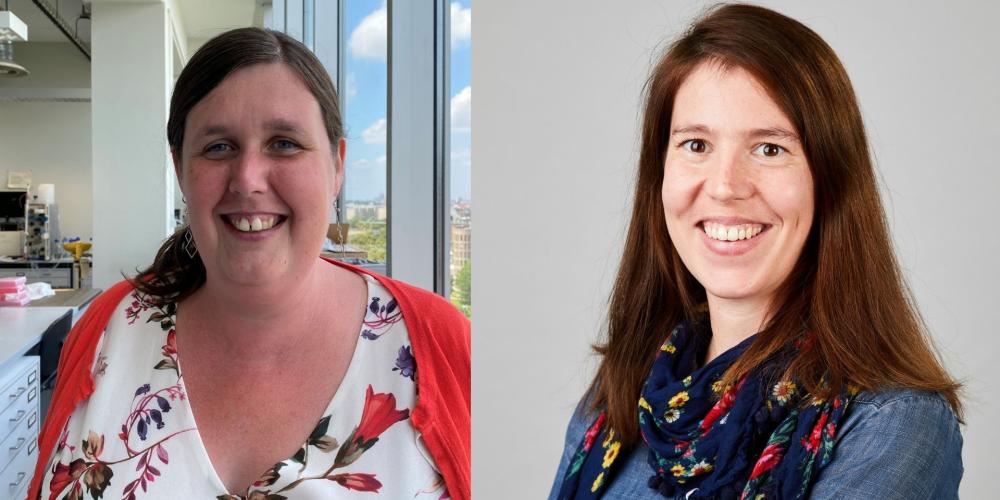
VUB scientists Inge Mannaerts and Sofie Deschoemaeker have been awarded a prestigious four-year postdoctoral fellowship by the Stichting Tegen Kanker. Mannaerts received it for her research on tumours in the liver, and Deschoemaeker for her research on better treatment of breast cancer. One of their illustrious predecessors is Damya Laoui, the VUB scientist who made a name for herself with her cancer research.
Sofie Deschoemaeker
Sofie Deschoemaeker is a member of the Cellular and Molecular Immunology research group of the Sciences and Bioengineering. She does research on triple-negative breast cancer (TNBC). This is an aggressive and difficult-to-treat form of cancer that affects one in six women with breast cancer.
Treatments for TNBC are still very limited: only patients with inherited mutations in the BRCA breast cancer genes are treated with a more targeted PARP inhibitor (PARPi) therapy. This therapy eliminates the defects caused by the mutations in the BRCA genes and thus causes cancer cells to die. Unfortunately, even these patients still relapse, so there is a need to develop better treatments.
The dendritic cell (DC) can play an important role in this process because this cell type is at the basis of inducing an effective anti-tumour immune response. In this project, she will investigate the impact of PARPi on the DCs in the tumour in order to determine how to increase the function of the DCs after PARPi treatment. These results will allow her to develop new combination treatments with PARPi on a rational basis and verify their effectiveness in breast cancer mouse models, a necessary step before they are applied to humans. Thus, with this project, she hopes to lay the foundation for the development of new, more effective treatments for TNBC.
Inge Mannaerts
Inge Mannaerts is part of the Liver Cell Biology research group in Biomedical Sciences. She studies how liver damage is a breeding ground for cancer and how that process can be slowed down.
Liver fibrosis is the ideal growth ground for primary liver tumours. This fibrosis results from long-term liver damage and is characterised by large amounts of scar tissue. Because of its unique dual blood supply, the liver is also frequently affected by metastases from other cancers such as breast, pancreatic and colon. In both cases, tumours in the liver are associated with high mortality rates and cancer treatments that have little success.
Mannaerts’ project uses revolutionary modern techniques to study cancer-supporting fibroblasts and determine whether they are descended from hepatic stellate cells. Hepatic stellate cells are present in every liver and are responsible for vitamin A storage and controlling the amount of connective tissue in the liver. In liver damage, stellate cells change function and produce large amounts of scarring. Also in liver cancer, stellate cells are believed to produce cancer-supporting scar tissue. In this project, Mannaerts first wants to describe whether there are differences in cancer-supporting fibroblasts between different liver cancers, and will then investigate how the tumour communicates with the scar-producing cells and whether blocking communication between the two slows cancer growth.
VUB's fight against cancer
VUB is an Urban Engaged University that is firmly committed to the fight against cancer through scientific research. Scientists from various fields – medicine, bioengineering, pharmacy, physiotherapy, psychology – work together on an interdisciplinary basis. Fundamental and clinical scientific research into cancer go hand in hand, which is why the UZ Brussel, VUB’s university hospital, is an important partner in research, therapy and care. More awareness about cancer is needed for its prevention and cure, while more awareness about scientific research benefits the search for remedies and patient well-being. VUB is therefore grateful for an initiative such as World Cancer Day on 4 February.